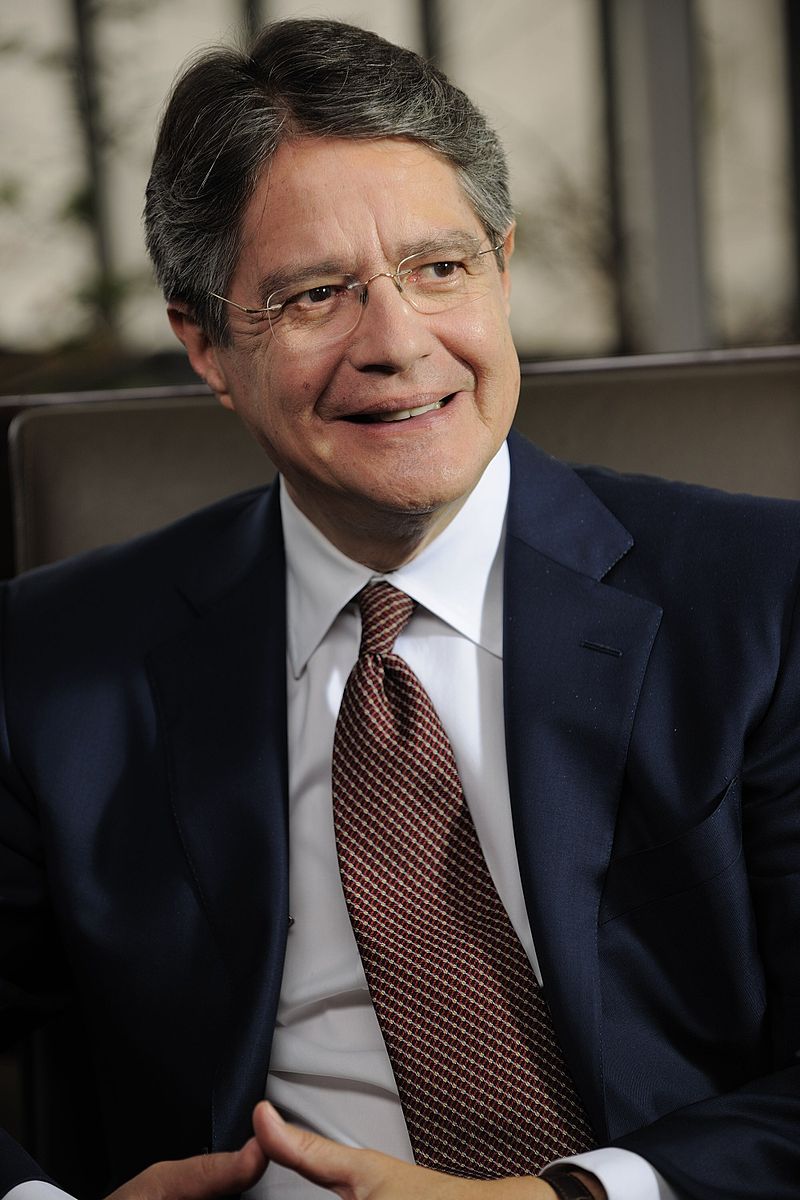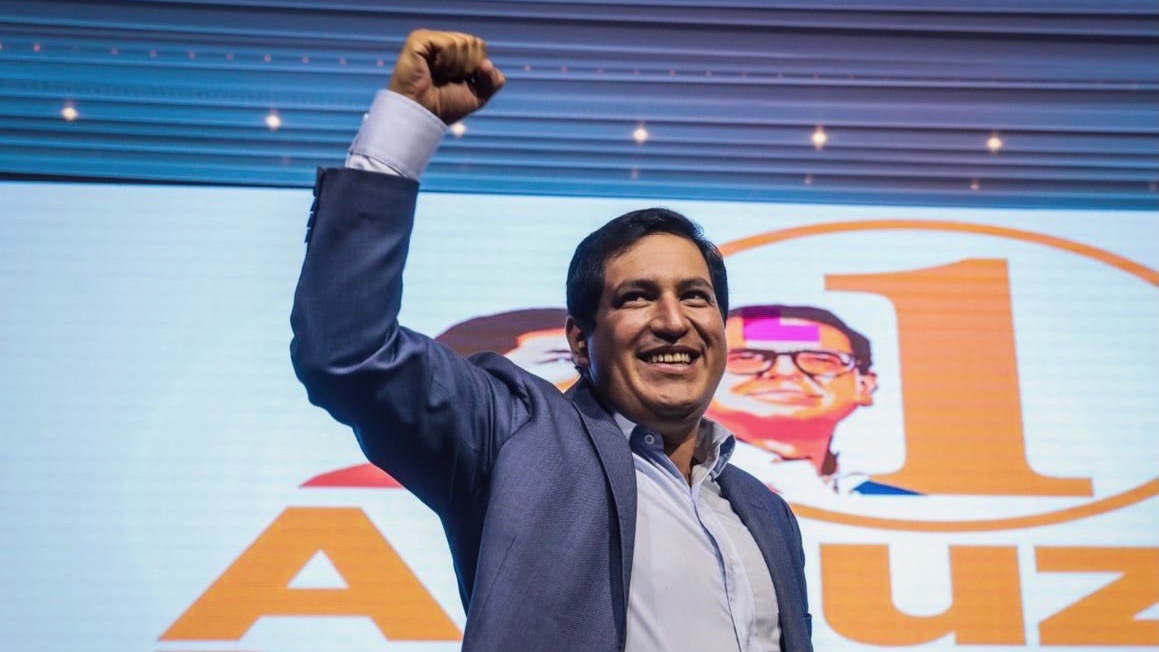The electoral campaign for the second round of the presidential elections in Ecuador on Sunday, 11 April has come to an end. The second round pits the banker Guillermo Lasso, the candidate of the capitalist oligarchy, against the candidate of the left-wing UNES, Andrés Arauz, who represents correísmo and who came first in the first round on 7 February. So far, the polls do not suggest a clear winner.
The electoral contest in Ecuador is taking place when the COVID-19 crisis is worsening, with an exponential increase in infections since the beginning of the year. Intensive care units in both the capital Quito and the country’s most populous city Guayaquil are at 100 percent capacity and experts debate whether this is the second wave or the country never really got out of the first wave, which hit Guayaquil particularly cruelly. The management of the pandemic by the Moreno government has been disastrous. Officially, the number of deaths exceeds 16,000, but this figure is far from reality. According to a study by the Financial Times, the excess mortality during the pandemic compared to a range of previous years is almost 40,000, according to data up to 23 December. This would give Ecuador a 70 percent excess mortality during the pandemic: the second-highest in the world, behind neighbouring Peru..
The pandemic has aggravated the worst economic crisis on record. In 2020, GDP registered a brutal contraction of 7.8 percent. In comparison, during the 1999 crisis that forced millions of Ecuadorians to emigrate, the contraction in GDP was less, at 6.8 percent. The World Bank foresees a slight ‘rebound’ in the economy this year, of just 3.4 percent, a figure that the IMF has just lowered to 2.4 percent. This is totally insufficient to recover what was lost. Stunted growth of 1.4 and 1.8 percent is predicted in the following years.
COVID catastrophe and economic chaos
Yet even these bleak prospects actually hinge on controlling the COVID-19 crisis through a mass vaccination campaign, a goal that is increasingly distant. So far, only 200,000 people have received the first dose of the vaccine, out of a target of vaccinating 9 million (60 percent of the population). Added to this, we have the scandalous revelation of preferential vaccination of officials around President Moreno, skipping the priority criteria.
Whoever wins the elections on Sunday will also inherit a country totally mired in debt. The total external and internal debt, which was 15,000 million dollars in 2017 when Lenín Moreno assumed the presidency, has now reached almost 70,000 million, representing a huge burden on the economy - almost 70 percent of GDP. It is estimated that, in the next five years, the debt payments, between amortizations and interests, will amount to 40,000 million dollars.
The crisis has also had a very strong impact on the living conditions of the majority of the population. From March 2020 to March 2021, 700,000 jobs have been destroyed, and only 360,000 have been created, according to official figures. This leaves a negative balance of 350,000 jobs in the formal sector, taking into account the fact that many of the new jobs created are in worse conditions than those that were destroyed.
The misnamed Humanitarian Law approved by the Moreno government last year was a true counter-reform of the labour laws that facilitated not only dismissals but also allowed for the worsening of workers’ conditions. And we have only talked so far about formal employment, when approximately 70 percent of the active population are in the informal sector or underemployed, with an even higher incidence among women. According to official figures, the percentage of the population living under the poverty rate, those who live on less than 2 dollars a day, went from 25 percent to 32.4 percent - reaching 48 percent of the population in rural areas.
This is the context of the economic and health debacle in which the presidential elections are being held, to which is added the long shadow of the October 2019 insurrection: a massive uprising of workers and peasants against the government of Lenín Moreno and his IMF-imposed austerity plan. That uprising, which threatened to overthrow the government, ended with only partial concessions due to the betrayal of the leadership of the main organisation of the indigenous masses, CONAIE, which at the last moment reached an agreement with Moreno.
The Ecuadorian working masses, therefore, consider the elections as an opportunity to defeat, not only the pro-imperialist bosses’ government of Moreno, but also the interests of the capitalist oligarchy, subjected to Washington, that he represents. Thus, in the first round of the elections, Moreno's party was practically swept off the map with just 1.5 percent of the votes. The UNES candidate, Andrés Arauz, achieved a clear victory, with 33 percent of the votes, representing the electoral expression of the rejection of Lenín Moreno and his anti-worker policy. Arauz's very clear result, polling more than 10 points ahead of the second candidate, was obtained despite a fierce campaign by the media and the state apparatus against him. This saw the participation of the Colombian Prosecutor's Office, which raised trumped-up allegations of links with Colombian guerrillas. Behind the campaign was the long arm of Washington, which wants to prevent at all costs the return of Correísmo to power.
No clear outcome
 The left-wing UNES candidate, Andrés Arauz, is practically tied in the polls with the banker candidate for imperialism and the oligarchy, Guillermo Lasso / Image: Mabel Velástegui
The left-wing UNES candidate, Andrés Arauz, is practically tied in the polls with the banker candidate for imperialism and the oligarchy, Guillermo Lasso / Image: Mabel Velástegui
The main candidate of the oligarchy, the banker Guillermo Lasso (Creo-PSC) obtained only 19 percent in the first round and had to compete vote by vote to reach the second round with the candidate of Pachakutik, Yaku Pérez, who presented himself as "the indigenous candidate" and achieved an almost-equal result. In the previous elections in 2017, Pérez and his movement, which is formally the political arm of the national indigenous peoples organisation CONAIE, had scandalously called to vote for the right-wing Lasso in the second round, arguing that they preferred "a banker to a dictatorship" (referring to Moreno who at that time was the candidate of the political movement of Rafael Correa). On this occasion, there was also talk of an open alliance between Pérez and Lasso, but in the end this was not possible. Under the pressure of the experience of the October 2019 uprising, the most CONAIE's right wing managed was to pass a motion in favour of a null vote in the second round on Sunday. Although this decision actually favors Lasso, at least it is not an open call to vote for the candidate of the oligarchy.
This null vote decision has caused strong divisions within the CONAIE rank and file. In the last days of the campaign, Jaime Vargas, one of CONAIE’s main leaders, came out publicly in support of Arauz, and he did so on behalf of the indigenous organisations of the Amazon region, which are part of CONAIE. This has even led to threats of expulsion, but it could have an impact in swinging a part of the indigenous vote, that went mostly to Yaku Pérez in the first round, towards the UNES candidate, Arauz.
Opinion polls do not give a clear forecast, and although most give Arauz a slight advantage, the margin is very tight. The media campaign against Arauz has been, as in the first round, fierce. It is clear that the capitalist oligarchy, the owners of agribusiness, large banks and companies, multinationals, and imperialism want to prevent at all costs the victory of the UNES candidate, whom they consider a threat to their interests. A defeat for Lasso would be a defeat for the owners of the country and for Washington.
In anticipation of a victory for Arauz, the bourgeoisie is already busy trying to limit his government’s powers through the misnamed Dollarization Protection Law, which, among other measures, entrenches the “independence” of the Central Bank. This measure aims to remove the government's control over monetary policy. In reality, what is involved is not the "independence" of the ECB, but rather ensuring that it continues to be completely controlled by the interests of the big capitalists, who have benefited from Moreno's management.
Arauz’s government programme undoubtedly contains a whole series of progressive measures: the intervention of the state to guarantee the delivery of essential services such as health and education, with targets for social inclusion and poverty reduction, among others; in addition to trying to get rid of the domination of US imperialism. However, Arauz's main limitation is the same as that of the Correa government at the time. They identify "neoliberalism", the "neoliberal model" or corruption as the problem that prevents policies in favor of the interests of the working class and the poor peasants. Therefore, they assume that it is possible to rule in a different way, within the limits of capitalism, as if it was all a question of political choice.
The Correa government, between 2007 and 2017, benefited, like other so-called “progressive governments” in Latin America, from a cycle of high oil prices. With a small hiatus in 2008, oil remained above $80 a barrel, reaching over $100 a barrel for several years. That cycle came to an end in 2014/15. On the basis of this oil income, the Correa government was able to apply a series of social policies that led to a general improvement in the living conditions of the masses, the reduction of poverty, etc. But as soon as that cycle was over, the government began to enter into crisis and lose popular support. While in 2013 Correa won the elections in the first round with 57 percent, in 2017, the candidate of the Citizens’ Revolution (who was Moreno, at that time presenting himself as Correa's political heir) won 39 percent, 20 points less, and he was forced to go to a second round.
Learn the lessons: break with capitalism!
We must explain that it is not possible to apply a policy in favour of the working class and the poor peasants within the framework of capitalism and even less in a backward country, dominated by imperialism, like Ecuador. The problem is not corruption. Corruption is inherent to the capitalist system. The problem is that a handful of oligarchs (bankers, capitalists, agro-capitalists and other parasites) have control of the wealth that the working class creates, and act as a transmission belt for the interests of the multinationals and imperialism that bleed the country through debt and "free trade" agreements.
Arauz may have good intentions and a progressive programme. But that programme, if he is elected, will collide head-on with the interests of the country's owners, the same ones who have used all the means at their disposal to try to prevent him from coming to power.
That is why the task is precisely to break with the limits of the capitalist system, through the expropriation of the rich, the national oligarchy and the multinationals, and the repudiation of the debt. What was proposed in the October insurrection was precisely the seizure of power by the workers and peasants: that the people ruled, instead of the oligarchy.
Lessons need to be learned. The lesson of the Correa government is it is not possible to rule in favour of the oppressed majority within the limits of capitalism. And the lessons of all the insurrections the oppressed have carried out in recent decades (overthrowing Bucaram, Mahuad and Gutierrez) and of the October 2019 uprising: it is not enough to overthrow a government, the working class must take power, and for that, it needs a revolutionary leadership that is up to the task.

